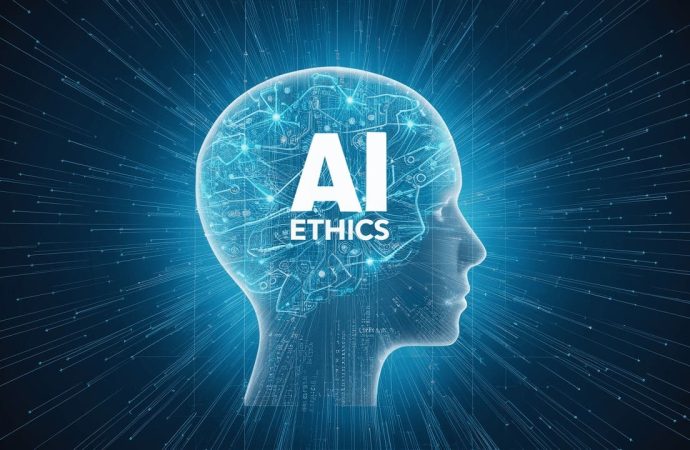Artificial Intelligence (AI) is no longer a concept confined to the pages of science fiction. From powering virtual assistants to driving autonomous cars, AI has transformed industries, reshaped businesses, and redefined how we interact with technology. But with great power comes great responsibility. AI’s rapid growth has sparked fierce debates about ethics, fairness, and accountability—raising
Artificial Intelligence (AI) is no longer a concept confined to the pages of science fiction. From powering virtual assistants to driving autonomous cars, AI has transformed industries, reshaped businesses, and redefined how we interact with technology. But with great power comes great responsibility. AI’s rapid growth has sparked fierce debates about ethics, fairness, and accountability—raising the question, how do we ensure these systems benefit humanity without reinforcing biases or overstepping privacy?
This blog explores AI ethics, including its foundational principles, real-world challenges, and the shared responsibility of stakeholders in ensuring a fair, transparent future for AI. We’ll also examine where the field is headed and why an ethical approach to AI development is a collective imperative you can’t ignore.
Understanding AI Ethics

Image by Yandex.com
To start, what is AI ethics? Simply put, AI ethics examines the moral implications of designing and deploying artificial intelligence. It addresses questions like:
- How do we ensure AI systems are unbiased and fair?
- Who is accountable when AI systems make mistakes?
- How do we protect user privacy in an era of ubiquitous data collection?
At its core, AI ethics is about aligning technology with human values. Ethical AI isn’t just a nice-to-have; it’s a necessity. Decisions made by AI systems increasingly affect hiring, healthcare, criminal justice, and beyond—fields with serious consequences for people’s lives. Without ethical guidelines, AI has the potential to create harm rather than deliver on its promise to enhance the world.
The Pillars of AI Ethics
Four foundational principles underpin ethical AI development and use. Let’s break them down:
1. Fairness
AI should treat all individuals equally—regardless of race, gender, age, or socio-economic status. However, fairness in AI isn’t as straightforward as it sounds. Because AI learns from historical data, it can unintentionally (or intentionally) replicate biases in that data.
For example, facial recognition software has been criticized for higher error rates in identifying people of certain ethnic backgrounds. Ensuring fairness involves proactively cleansing data of bias, implementing testing processes for inclusive outcomes, and establishing clear guidelines to evaluate algorithmic fairness.
2. Accountability
When things go wrong with AI—say, a healthcare AI misdiagnoses a patient—who is responsible? Accountability in AI demands clear frameworks to determine responsibility. It also requires developers and organizations to document how decisions are made and to provide auditing mechanisms for system performance.
Accountability ensures that businesses and developers own up to mistakes, fixing flaws instead of hiding behind the complexity of algorithms.
3. Transparency
For users to trust AI, its processes must be understandable. Transparency means revealing how an algorithm works, the kind of data it uses, and the reasoning behind its decisions. A black-box AI system that operates without explanation doesn’t just frustrate users—it can also lead to legal and ethical risks.
Tools like Explainable AI (XAI) are paving the way for more transparent models. For instance, Google’s “What-if Tool” offers visual insights into how small changes in input data can affect predictions, demystifying complex AI systems.
4. Privacy
With AI comes unprecedented access to data—raising serious privacy concerns. Whose data is being collected? How is it stored? And are users fully informed about potential risks?
Take smart devices, for instance. Virtual assistants like Alexa and Google Assistant continuously listen for commands—often collecting more data than users realize. Ethical AI prioritizes protecting individual privacy, adopting measures like encryption, anonymization, and obtaining explicit user consent before collecting data.
Lessons from Real-World Cases

Image by Yandex.com
AI’s ethical challenges aren’t theoretical—they’re playing out in real life. Here are some notable case studies:
- COMPAS (Northpointe, Inc.’s Recidivism Software): Used in U.S. criminal justice systems, COMPAS was found to have racial biases in predicting “risk scores,” unfairly assigning higher recidivism risks to Black defendants.
- Amazon’s AI Hiring Tool: Amazon developed an AI recruiting tool, only to discover it discriminated against female candidates because it was trained on decades of biased hiring data.
- Facebook Cambridge Analytica Scandal: Data privacy concerns reached new heights when it was revealed AI tools used Facebook data to sway elections, sparking worldwide discussions about informed consent.
These cases highlight the risks of ignoring ethical principles. On the other hand, addressing issues head-on can restore trust and improve AI’s societal impact.
Who’s Responsible? The Role of Stakeholders
The ethical use of AI rests on the shoulders of multiple stakeholders, each playing a critical role:
- Developers and Researchers: The people creating algorithms must prioritize ethical guidelines from the start—training models on bias-free data and rigorously testing their systems.
- Businesses and Enterprises: Companies deploying AI must be proactive about accountability and transparency. This includes adopting frameworks like “Ethics-by-Design”—integrating ethical considerations into every stage of product development.
- Governments and Policymakers: Governments shape the ethical AI landscape through regulations and policies. For instance, the European Union’s GDPR (General Data Protection Regulation) holds companies accountable for user privacy.
- End Users and Advocates: Ultimately, users must stay informed and voice concerns when encountering unethical practices. Ethical AI advocacy groups can support this effort by holding companies accountable.
No single entity can ensure AI ethics—it’s a collective responsibility.
The Road Ahead for Ethical AI

Image by Yandex.com
What does the future hold for AI ethics? Here’s what’s on the horizon:
- Stronger Regulations: Expect more governments to establish laws governing AI, particularly when it comes to privacy and fairness.
- Collaborative Frameworks: Companies are increasingly forming alliances like the Partnership on AI to agree on global ethical standards.
- AI as a Force for Good: Beyond mitigating harm, the next step for AI ethics is deploying technology to tackle issues like climate change, inequality, and education gaps.
The future depends on proactive measures. Ethical AI isn’t going to happen by default; it will require continuous negotiation, innovation, and collaboration.
A Call to Act: Prioritize Ethical AI
The stakes have never been higher. AI has the power to change the world—but it’s up to us to decide in what direction. Acting responsibly doesn’t just protect users—it opens up incredible opportunities for businesses and society alike. Whether you’re a business leader, developer, or enthusiast, make a commitment to prioritize ethical AI practices today.
















